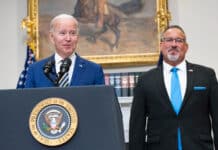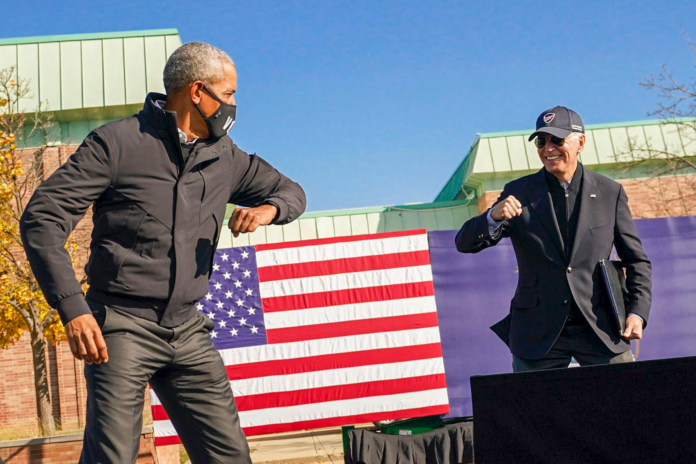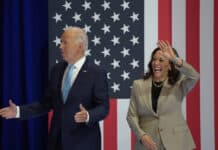While Secretary of State Tony Blinken recently had some reassuring words on Myanmar and Russia, President Joe Biden’s administration has been iffy on China and their ongoing atrocities.
More concerning, actions the past 16 days indicate that the Biden administration seems to prefer partisan politics over common sense foreign policy. Here are three frustrating international moves the new regime has made to weaken America:
Russia
Beginning with Hillary Clinton’s “Russian Reset” 12 years ago, the Obama-Biden administration never was tough on Russia.
The 2010 arms control deal with Russia didn’t cover half of Vladimir Putin’s arsenal and allowed the rogue regime to build more nuclear weapons.
With the New START treaty due to expire, former President Donald Trump’s administration negotiated for a better deal; Team Biden ignored this and quickly signed a five-year extension of Obama’s agreement with no preconditions.
Signing up for the same failed policy shows Biden prefers to honor Obama-era mistakes rather than delivering peace through strength. Once Biden telegraphed his support of the extension to Putin, the Russians sprung into action with parliament approving the measure and the tyrant signing it.
Biden’s decision to unconditionally extend New START sends no promising signs about his ability to deal with Moscow. Biden boasted of this treaty yesterday, claiming Trump “rolled over” to Russia. I’d argue Biden did so this week.
Where the prior president’s rhetoric often failed — the Helsinki press conference where Trump took Putin’s word over U.S. intelligence and the president’s effort to hold up defensive aid to Ukraine — his administration often countered Putin’s ambitions. Trump implemented aggressive sanctions in an attempt to kill a Russian pipeline that would’ve harmed Ukraine, and also expelled Russian officials in response to the poisoning of a former Russian spy.
Middle East
Before the Trump team left the White House, they had crushed most of the ISIS Caliphate, isolated Iran, and normalized relations between Israel and several Arab nations.
This established the strongest foundation for stability in the Middle East in my lifetime.
But rather than build on success, Biden has delivered perplexing messages about returning to the fatally-flawed Iran Nuclear Deal, another John Kerry escapade that empowered evil in the Middle East. China and Russia, for what it’s worth, love the one-sided deal.
Shouldn’t the Biden administration build on policies to promote collective security and economic cooperation that smothers Iran? That would be good for America and the world. Instead, he seems more concerned with resurrecting Obama’s failed Middle East agenda.
Biden’s also hired poorly, with high-ranking anti-Semites in the State Department. Most ignominious perhaps is Robert Malley, who has secretly met with Hamas and is sympathetic to the terrorist organization. Needless to add, the “special envoy” is also eager to appease the Persian totalitarians and rejoin the disastrous deal.
“A Malley appointment is another indication that the re-Bama administration of President Biden will put America and our ally Israel in grave danger,” Jeff Dunetz wrote in a scathing blog piece last month. “We will be returning to the lead from behind, appease terrorists, apologize for the American foreign policy of Obama and many of his predecessors, leading to a nuclear Iran, a lack of respect for the United States, and an increase in terrorist attacks.”
Cancelling Keystone XL
I wrote about this preventable situation the day it occurred. A safe and important project, Keystone would have more than doubled our capacity to import Canadian crude oil efficiently via pipeline. The oil will still move, and now shall be transported via alternative means, like trains, trucks and barges; these create more greenhouse gasses, have a larger emissions footprint, and are more apt to spill. Media skepticism of these facts is absent.
The permit cancellation killed tens of thousands of jobs and raised energy costs in the U.S. and Canada. Many indigenous groups also lose out and, like with many “green” hoaxes, the poor get poorer. There are NO winners — except maybe wealthy urban activists with little concern for the overall economy or working Americans — and it’s an insulting blow to our closest ally. Alberta Premier Jason Kenney called the move a “gut punch” for the countries’ relationship.
If you want to cripple the nation’s energy security and enable Putin, then killing Keystone is a solid idea. If you want a sustainable future and to show global leadership, the unilateral decision two weeks ago was wrong.
The Trump administration rightly approved Keystone and pulled out of the toothless Paris agreement, because the latter’s provisions didn’t curtail the world’s biggest emitter, China, while imposing tremendous costs on the United States. None of the signatories, unsurprisingly, have achieved any goals in the hollow agreement. Indeed, China’s greenhouse gas emissions are now double ours and higher than when Beijing signed on.
Meanwhile, despite not being in the accord, America made remarkable progress on carbon emissions via the free market. Rejoining irrelevant Paris is a stunt to drive a radical agenda that makes us less competitive. It’s a lose, lose. If John Kerry is involved, be skeptical.
Rather than being satisfied by this job-killing debacle, the far left alarmists want Biden to destroy more pipeline projects across the country.
President Biden gave a foreign policy speech Thursday afternoon, using terms like “leading with diplomacy,” “advancing security,” and “reclaiming credibility and moral authority.” These are undeniably platitudes scribed by young Ivy League grads that may appeal to a compliant media but actions speak louder. I pray for some improvement.
A.J. Kaufman
A.J. Kaufman is an Alpha News columnist. His work has appeared in the Baltimore Sun, Florida Sun-Sentinel, Indianapolis Star, Israel National News, Orange County Register, St. Cloud Times, Star-Tribune, and across AIM Media Midwest and the Internet. Kaufman previously worked as a school teacher and military historian.
















